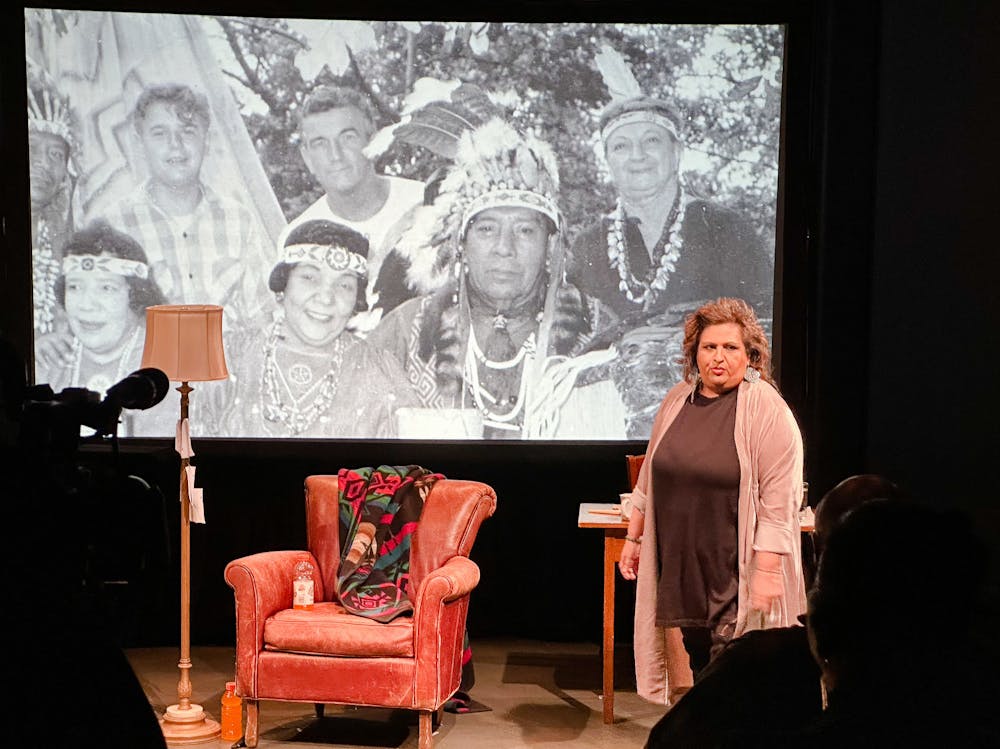In the 1800s, Murielle Borst-Tarrant’s family left Virginia for New York City, where they would remain for four generations. Her family settled in Brooklyn, in what she described “a Mafia-run neighborhood,” where her family were the only Native Americans on the block.
Borst-Tarrant shared personal vignettes from this upbringing in her one-woman show, “Tipi Tales from the Stoop,” held Friday at the Granoff Center for the Creative Arts. The show, which explored both humorous family moments and the insecurities she faced growing up, was directed by Assistant Professor of Theatre Arts and Performance Studies Sarah dAngelo.
Borst-Tarrant maintained a humorous tone for most of the show, in which she brought audience members through scenes from her childhood: family gatherings, vacations and conflicts. Her exaggerated imitations of family members — her grandmother, mother and cousins — elicited laughter from the audience.
Borst-Tarrant described her day-to-day life in Brooklyn throughout the performance, which included sprinting to her freezer to stay cool in the summers, dancing to music on the television and running to her apartment for dinnertime, which her family held two hours after the white families on her block.
A member of the Kuna and Rappahannock nations, Borst-Tarrant interspaced her lighthearted monologue with intimate descriptions of the challenges she faced growing up because of her identity. She described a “sadness and rage” of “never quite fitting in, never quite being good enough, never being the right color, always trying to get a small piece of the American dream … and not quite making it.” Visiting her childhood home elicits these feelings, she shared.
The show, which dAngelo said is still being developed, was followed by a brief talkback with Borst-Tarrant and dAngelo, moderated by Avery Willis Hoffman, artistic director of the Brown Arts Institute. Audience members were encouraged to provide feedback.
The latest version of the performance included new set pieces, as well as background music and visuals appearing on three large screens behind Borst-Tarrant during the performance, according to dAngelo.
Addressing the audience, dAngelo noted her enthusiasm for the continuing development of the show, a process that she considers her “favorite part of theater because it really gives you a sense of collaboration.”
The ongoing development of the performance means that audience members will “never see (the show) again like this,” dAngelo noted.
Attendees praised Borst-Tarrant for her storytelling ability and upbeat tone.
Lori Hazard, who attended the show, said the performance was “great” and brought back memories of her Native American family who also lived in Brooklyn. “It reminded me of my cousin,” Hazard said.
Audience member Sherenté Harris ’23 described the show as “fabulous.”
“I love seeing Indigenous people from this region being represented, not only telling our traditional stories, but (also) our stories of today,” Harris said. “I loved how this family history was interwoven into (her) larger narrative, and I love that it incorporated so much humor.”

Neil Mehta was the editor-in-chief and president of the Brown Daily Herald's 134th editorial board. They study public health and statistics at Brown. Outside the office, you can find Neil baking and playing Tetris.





